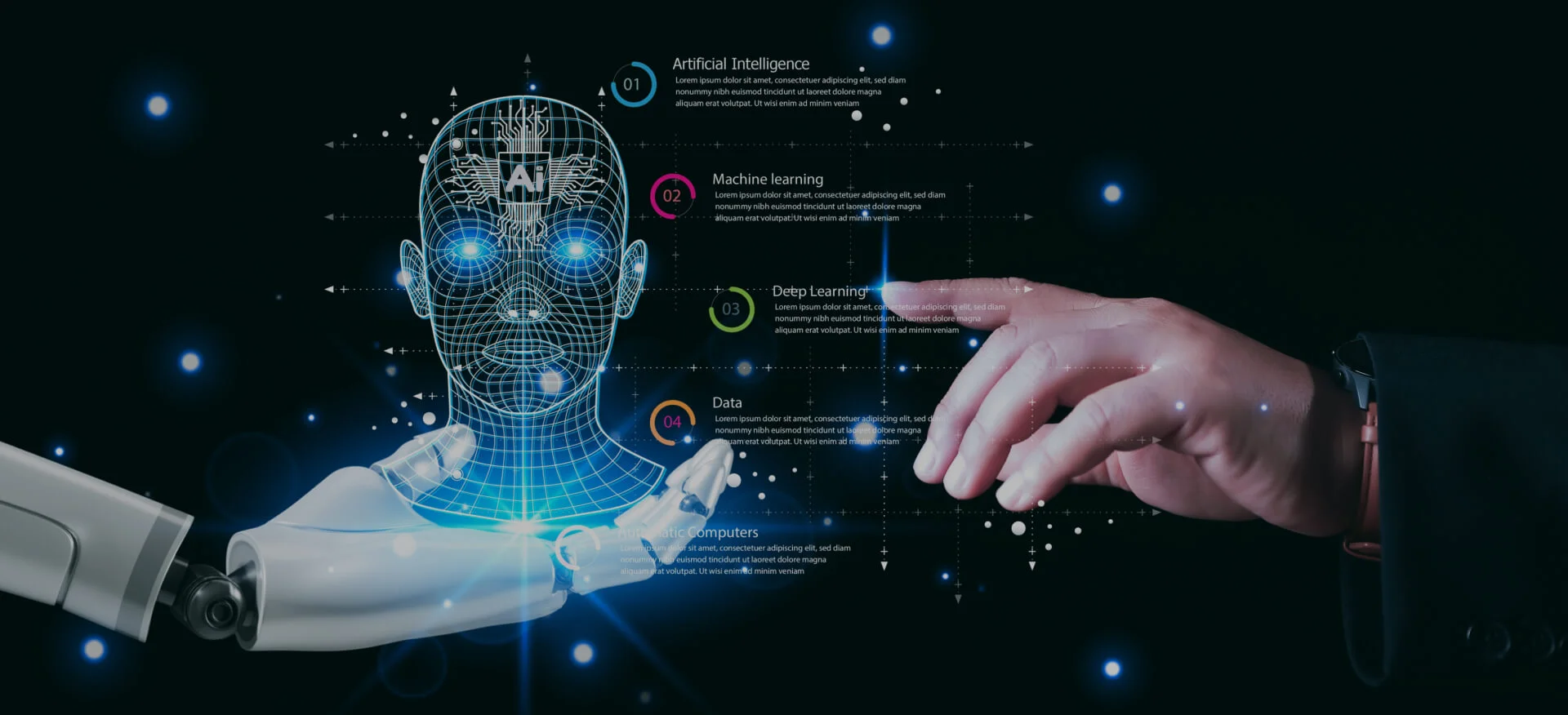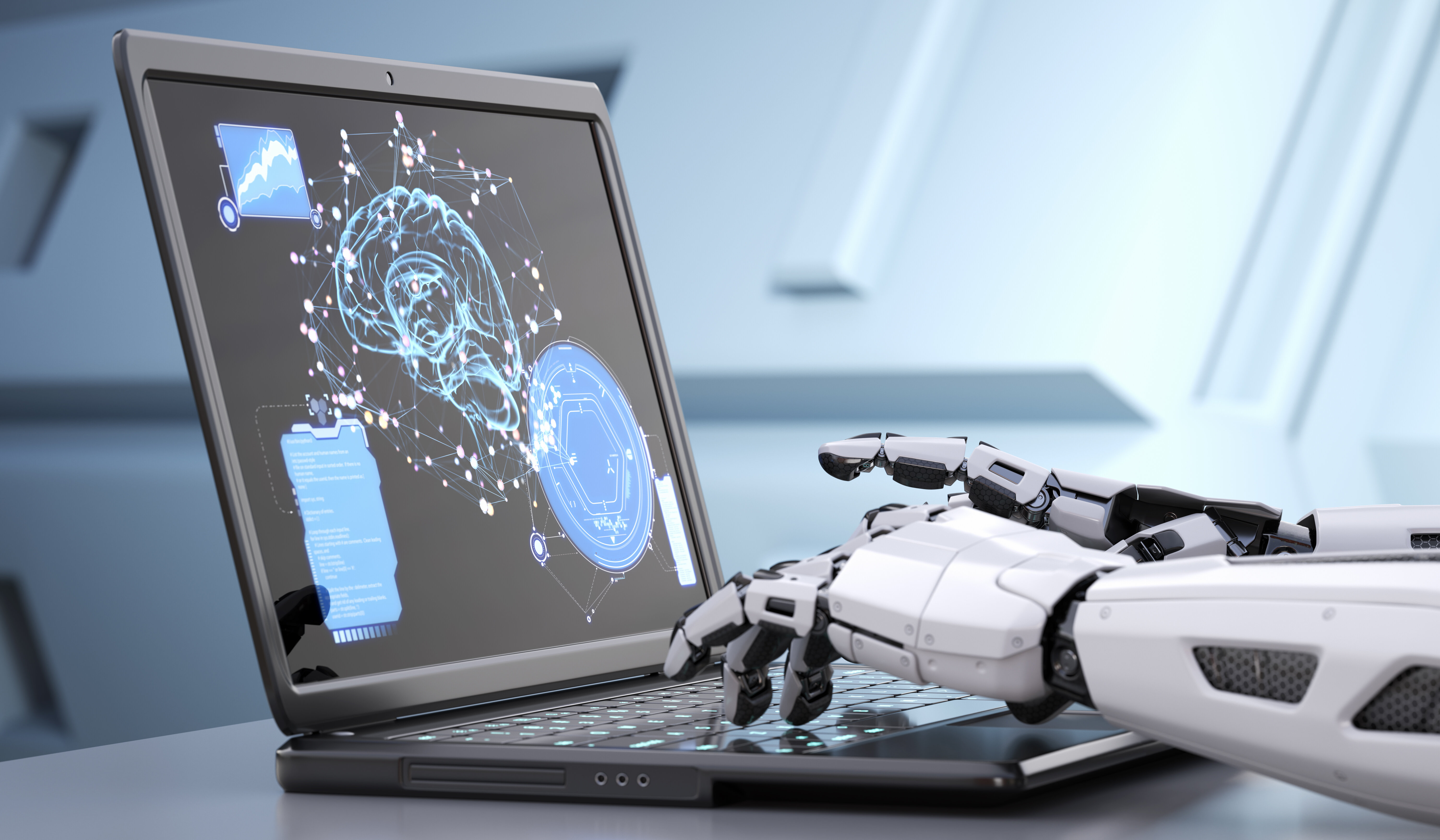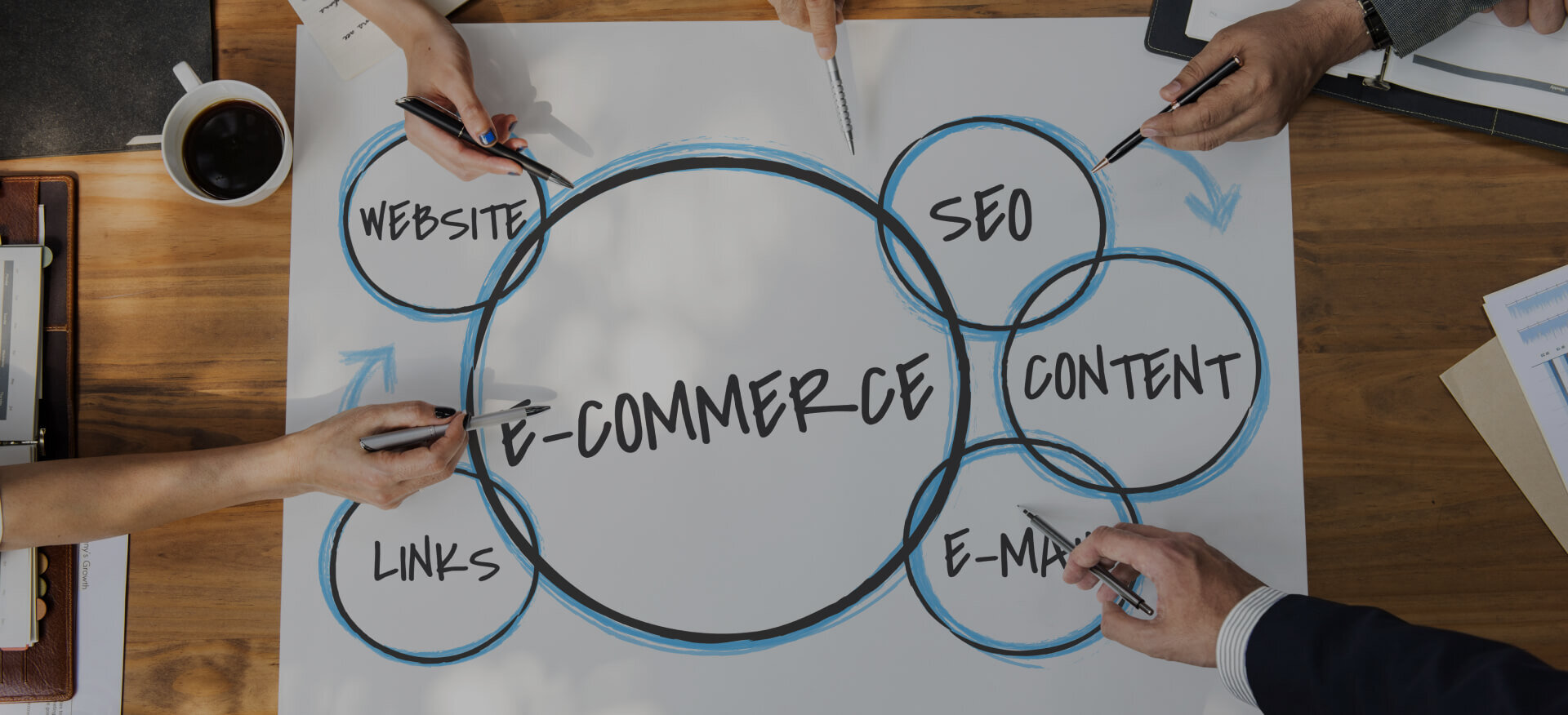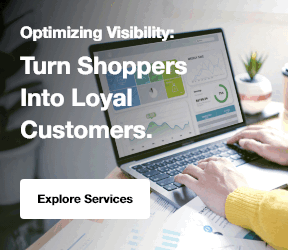Today, businesses are under constant pressure to innovate and stay ahead of the competition.
With tech transformation everywhere, an AI automation agency plays a key role in helping companies leverage artificial intelligence to simplify processes and achieve growth faster than ever before.
AI automation agencies are specialized service providers that integrate artificial intelligence (AI) into business processes to streamline operations, improve efficiency, and drive growth.
These agencies leverage advanced AI technologies such as machine learning, natural language processing (NLP), and robotic process automation (RPA) to help businesses automate repetitive tasks, enhance decision-making, and reduce operational costs.
Moreover, AI enhances business performance by enabling faster decision-making, optimizing resource allocation, and improving customer experiences through personalized interactions.
This guide explains how AI automation agencies work, their benefits, and why they have become essential for modern businesses.
What is an AI Automation Agency?
An AI automation agency is a specialized firm that helps businesses implement artificial intelligence (AI) solutions to automate processes, enhance efficiency, and optimize performance.
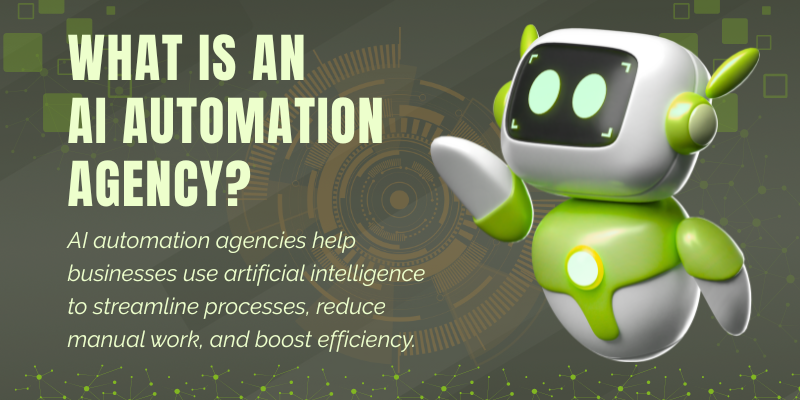
These agencies often integrate marketing automation tools to streamline marketing tasks such as customer segmentation and campaign optimization. What Is Business Process Automation? It refers to automating key business processes to improve efficiency and productivity."
The role of an AI automation agency is to help businesses integrate AI into their operations, reduce manual effort, improve accuracy, and accelerate decision-making while driving cost savings and scalability.
These agencies leverage various AI technologies, such as machine learning, robotic process automation (RPA), and natural language processing (NLP), to create tailored automation strategies for their clients.
The role of an AI automation agency is to help businesses integrate AI into their operations to reduce manual effort, improve accuracy, and accelerate decision-making while driving cost savings and scalability.
Additionally, AI automation agencies may offer creative services, allowing businesses to explore new possibilities and design innovative solutions to transform their processes. When comparing options for AI-driven solutions, a topic often discussed is Gemini vs ChatGPT, where businesses evaluate the strengths and capabilities of these two AI models in automating tasks and improving business performance.
Top 4 Benefits of AI Automation Services
AI automation services are designed to make business processes smarter, faster, and more efficient. With the implementation of B2B marketing automation tools, businesses can automate targeted marketing efforts, enhancing customer engagement and retention.
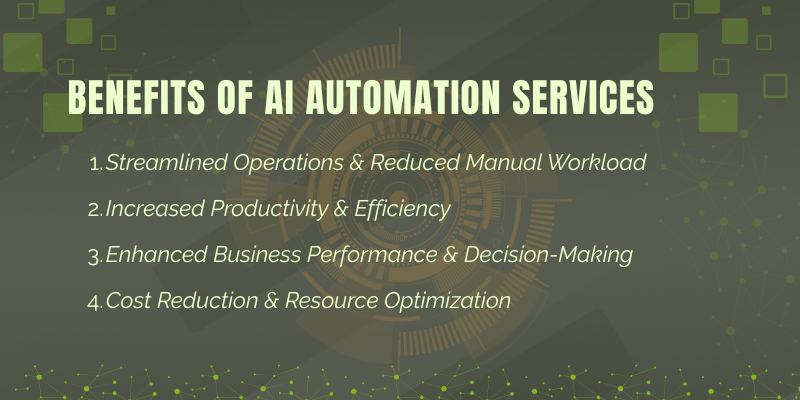
Here’s a deeper look at how each benefit works:
1. Streamlined Operations and Reduced Manual Workload
AI automation services eliminate repetitive, time-consuming tasks, allowing businesses to automate processes such as data entry, customer queries, and report generation.
This not only reduces the manual workload but also ensures consistency and accuracy across operations, enabling teams to focus on higher-value tasks, like SEO services to enhance online visibility.
2. Increased Productivity and Efficiency
By automating routine tasks, AI tools help businesses achieve higher productivity levels and faster execution times.
With best automation software for digital transformation, AI can process data at scale and speed far beyond human capabilities, ensuring that operations run smoothly and efficiently.
AI can process data at scale and speed far beyond human capabilities, ensuring that operations run smoothly and efficiently with minimal delay, which accelerates overall business processes.
3. Enhanced Business Performance and Decision-Making
AI automation services provide valuable insights through data analysis and predictive analytics, empowering businesses to make better, data-driven decisions.
For example, predictive analytics tools can optimize Google keyword ranking, helping businesses identify high-traffic keywords and improving their digital marketing efforts.
AI's ability to analyze vast amounts of data in real-time helps optimize performance, predict trends, and improve business strategies, driving growth and competitive advantage.
4. Cost Reduction and Resource Optimization
AI automation reduces the need for human intervention in routine tasks, resulting in lower labor costs.
By leveraging tech marketing agency tools, businesses can also optimize marketing spend, ensuring efficient allocation of resources and maximizing ROI.
Additionally, it allows businesses to optimize resource allocation, minimizing waste and improving operational efficiency.
As a result, businesses can achieve cost savings while ensuring that their resources are being used effectively to maximize returns.
Other Types of AI Agencies
As AI automation continues to reshape business operations, there are several types of AI-driven agencies that companies can explore to optimize various departments. These agencies can help businesses reduce bottlenecks, improve performance, and drive growth. Here are a few types of AI agencies to consider:
1. AI Marketing Agency: Elevating Marketing with Automation
- Specializes in AI-powered analytic tools to track sales, analyze trends, and measure ROI.
- Helps business leaders make data-driven decisions and optimize marketing campaigns.
- Ideal for starting an AI automation digital agency, as demand for data analytics solutions grows.
2. AI Development Agency: Custom AI Solutions for Your Business
- Focuses on creating bespoke AI solutions like chatbots, virtual assistants, content engines, and machine learning applications.
- Provides tailored AI services to meet the unique needs of businesses.
- A great option for those wondering how to start an AI agency by offering customized development services.
3. AI Sales Agency: Boosting Sales Efficiency Through Automation
- Specializes in automating lead generation, email outreach, and appointment scheduling.
- Streamlines the sales funnel, increasing productivity while reducing strain on sales and customer service teams.
- Helps businesses maximize profits and sales efficiency through AI-powered automation.
Explore Our Web Design & Development Services!
6 Key AI Automation Technologies Used by Agencies
AI automation agencies use a combination of cutting-edge technologies to help businesses automate tasks, make data-driven decisions, and improve performance.
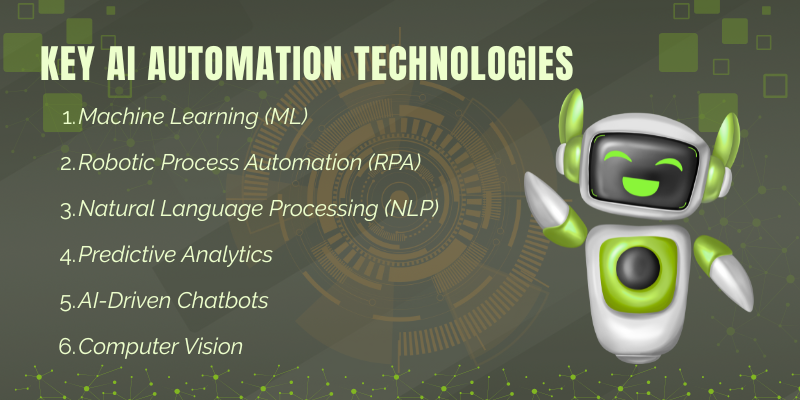
Here’s a breakdown of each:
1. Machine Learning
Machine Learning is at the core of many AI-driven solutions. It enables systems to analyze large volumes of data, identify patterns, and make predictions without requiring explicit programming.
In oil and gas marketing agency, for instance, machine learning models can predict the success of digital ad campaigns by analyzing past performance and user behavior.
Over time, these systems improve as they process more data, becoming smarter and more accurate. Businesses use machine learning for tasks such as personalized marketing campaigns, fraud detection, demand forecasting, and predictive maintenance.
For example, an e-commerce company can use ML algorithms to recommend products based on customer behavior, boosting sales and customer satisfaction.
2. Robotic Process Automation (RPA)
Robotic Process Automation focuses on automating repetitive, rule-based tasks that typically consume a significant amount of employee time.
By using software bots, businesses can streamline processes like data entry, invoice management, payroll processing, and report generation. This not only saves time but also minimizes human error, resulting in more efficient operations.
For example, a finance department can use RPA to automatically process thousands of invoices daily, allowing employees to focus on more strategic tasks like financial planning and analysis.
3. Natural Language Processing (NLP)
Natural Language Processing enables machines to understand, interpret, and respond to human language, whether spoken or written.
This technology powers AI applications such as chatbots, voice assistants, and sentiment analysis tools. Businesses leverage NLP to provide better customer support, analyze customer feedback, and automate communication tasks.
For example, a retail company can deploy an NLP-driven chatbot to assist customers with order tracking or product inquiries, reducing the need for human customer service agents while providing instant support.
4. Predictive Analytics
Predictive analytics uses AI algorithms to analyze historical data and predict future outcomes, helping businesses make proactive decisions.
This is especially valuable in marketing campaigns where knowing what are five marketing strategies that retailers spend half of their annual budget on can help optimize budget allocation.
It is widely used across industries to forecast trends, manage risks, and optimize resources.
For example, in the retail industry, predictive analytics can help determine which products are likely to be in high demand during specific seasons, enabling better inventory planning.
In healthcare, it can predict disease outbreaks or patient readmission risks, improving patient care and operational efficiency.
5. AI-driven Chatbots
AI-driven chatbots use advanced AI and NLP capabilities to simulate human-like conversations, offering instant, 24/7 customer service.
These chatbots can handle a variety of tasks, from answering frequently asked questions to scheduling appointments or assisting with troubleshooting.
For instance, an airline can use an AI chatbot to assist passengers with booking changes, flight updates, or baggage inquiries without requiring human intervention. This process can also be applied to What Is YouTube Automation, where automation tools help manage YouTube channels and videos more efficiently.
6. Computer Vision
Computer Vision allows machines to interpret and analyze visual data from images and videos, similar to how humans perceive visual information. This technology is used in various industries, including manufacturing, healthcare, and security.
In retail, computer vision can help automate inventory management, supporting the best marketing tactics for businesses that rely on visual branding.
In manufacturing, computer vision systems can detect defects in products on the assembly line, ensuring quality control.
Computer vision also plays a vital role in facial recognition, self-driving cars, and surveillance systems, making it one of the most versatile AI technologies today.
These technologies, when combined, give AI automation agencies the power to streamline workflows, enhance decision-making, and create scalable, cost-efficient solutions tailored to modern business challenges.
How AI Automation Agencies Help Different Industries?
As AI automation matures and proves its value across sectors, industries from real estate to luxury brands are tapping into its transformative power.
By customizing AI tools and strategies to the unique challenges and workflows of each sector, AI automation agencies help companies unlock new efficiencies, improve customer experiences, and gain a competitive edge.
Here are specific ways AI automation applies across different industries:
1. Real Estate
AI automation agencies can help real estate firms automate property valuation, tenant screening, and lease management.
Using predictive analytics and machine learning, they can forecast property prices based on market trends and local data.
A real estate marketing agency can further enhance these efforts by integrating advanced marketing strategies that attract potential buyers or renters more effectively.
They also deploy NLP tools to analyze lease agreements, extract key clauses, and flag compliance issues. Virtual tours and chatbots assist potential buyers or renters instantly, reducing staff workload and improving user experience.
2. Retail
In the retail industry, AI automation supports personalization, inventory management, and customer service.
Agencies can implement recommendation engines that suggest products based on user behavior, dynamic pricing models that adapt to demand, and AI chatbots that assist customers 24/7.
They also help with demand forecasting to avoid stockouts or overstock situations.
3. Oil & Gas
AI automation in oil & gas focuses on predictive maintenance, resource optimization, and safety monitoring. Agencies can deploy AI models that monitor equipment sensors to predict failures before they happen, reducing downtime.
An Oil and gas marketing agency can help leverage these insights to improve marketing efforts by targeting the right stakeholders with data-driven campaigns.
They can analyze seismic and production data to optimize drilling decisions and adjust operations for maximum yield.
AI also helps in anomaly detection in pipelines, leak detection (via computer vision and sensor networks), and operational scheduling to improve efficiency and reduce risk.
4. Food & Beverages
For F&B companies, AI automation can optimize supply chains, reduce waste, and boost product innovation.
A food and beverage branding agency can further enhance these efforts by using AI insights to tailor marketing strategies that resonate with target consumers based on their preferences and trends.
Agencies can use AI to forecast demand using seasonality, promotions, and consumer trends, ensuring production aligns with actual need.
Computer vision systems can check product quality on manufacturing lines. AI can also customize marketing campaigns based on consumer tastes and dietary preferences. Moreover, generative AI can help in recipe formulation or packaging design.
5. Luxury Brands
Luxury brands benefit from AI automation in personalization, clienteling, and supply chain optimization.
A luxury branding agency can leverage AI to enhance personalization efforts, offering ultra-personalized product recommendations or style suggestions suited to an individual’s profile.
Agencies help brands offer ultra-personalized product recommendations or style suggestions suited to an individual’s profile.
They can use AI to segment high-value clients, predict purchasing behaviors, and optimize inventory of limited edition items.
AI also supports demand forecasting for exclusive drops and helps maintain the brand essence through tailored messaging.
The Process of Working with an AI Automation Agency
It involves consultation to understand business needs, designing and integrating a tailored solution, followed by implementation and ongoing support to ensure continuous optimization.
1. Consultation and Understanding Business Needs
The first step in working with an AI automation agency involves a thorough consultation where the agency’s experts engage with the client to understand their specific business challenges, goals, and pain points.
This phase includes identifying the areas within the business that can benefit from automation, such as customer service, data processing, or decision-making.
The agency takes the time to listen to the client's objectives and gather detailed information about their existing systems, infrastructure, and workflows.
This understanding ensures that the AI solution is tailored to the client’s unique needs, ensuring maximum efficiency and effectiveness.
2. Solution Design and Integration
Once the business needs are clearly defined, the agency moves to the solution design phase.
Here, they design a customized AI solution that aligns with the client’s objectives, utilizing advanced AI technologies such as machine learning, RPA, or NLP.
The design process involves selecting the appropriate tools, technologies, and frameworks that will integrate smoothly with the client’s existing systems.
The agency then integrates the AI solution with the client’s business environment, ensuring that the new system works seamlessly with existing workflows, databases, and software applications.
This integration is crucial for a smooth transition and to avoid any disruptions to daily operations.
3. Implementation and Ongoing Support
After the solution is designed and integrated, the AI automation agency handles the full implementation of the system, including deploying the solution into the production environment, ensuring that it functions as expected.
This stage also includes data migration, system testing, and user training to ensure the client’s team can effectively use the new system.
Once the solution is live, the agency provides ongoing support to monitor performance, troubleshoot any issues, and offer regular updates or optimizations as needed.
This continuous support ensures that the AI system adapts to changing business needs, remains efficient, and continues to provide value over time.
Future of AI Automation
As AI continues to evolve at a rapid pace, the future of automation promises to be more intelligent, autonomous, and integrated than ever before.
AI automation agencies will move beyond simply automating repetitive tasks to architecting systems that proactively sense, adapt, and optimize business operations in real time.
The next generation of automation will blur the line between human and machine collaboration, unlocking new levels of efficiency and innovation.
Here are some key trends to watch:
1. Agentic / Autonomous AI Agents
AI systems will increasingly act as proactive agents—making decisions, performing tasks, and orchestrating workflows with minimal human oversight.
2. Built-in and Embedded AI
Rather than standalone tools, AI will be embedded across software, devices, and business systems to enable seamless automation everywhere.
3. Human-Machine Collaboration (Augmented Intelligence)
Automation will augment human work, integrating natural interfaces and feedback loops so humans and AI systems co-create more intelligently.
4. Ecosystem & Platform Automation
Automation will no longer be siloed, platforms will connect data, systems, people, and AI across organizations to orchestrate end-to-end processes
5. Governance, Ethics & Responsible AI
As automation becomes more powerful, agencies and businesses will need stronger frameworks for AI safety, fairness, privacy, and transparency.
6. Proactive / Predictive Optimization
Systems will not just react, they will anticipate issues and optimize operations before problems emerge, enabled by predictive analytics and real-time feedback loops.
7. Intelligent Orchestration
Automation orchestration will evolve, AI will coordinate bots, humans, and systems in more intelligent ways, ensuring the right actions happen at the right time.
Looking ahead, AI automation is poised to become a foundational layer of business infrastructure, not just an add-on.
Frequently Asked Questions
What is AI Automation?
AI automation refers to the use of artificial intelligence technologies to automate repetitive tasks, processes, and decision-making. This can include everything from data analysis and customer service (e.g., chatbots) to complex business operations (e.g., predictive analytics, supply chain management).
What Does AI Automation Agency Do?
An AI automation agency specializes in implementing AI-powered solutions to automate various business functions. This can include automating marketing campaigns, sales processes, customer support, data analysis, and other tasks to increase efficiency, reduce costs, and improve decision-making.
How Much Do AI Automation Agencies Charge?
The cost of AI automation agencies can vary widely based on the complexity of the project and the services provided. Generally, fees can range from:
- $5,000 to $50,000+ per project for small to medium-sized businesses.
- $100,000+ for large-scale, custom AI solutions for enterprises.
- Pricing models may include hourly rates, project-based fees, or retainer agreements.
What Industries Benefit the Most From AI Automation Services?
Industries such as retail, healthcare, finance, manufacturing, and logistics benefit significantly from AI automation, as it helps optimize processes, improve efficiency, and enhance customer experiences.
How Does AI Automation Improve Business Becision-Making?
AI automation enhances decision-making by analyzing large volumes of data in real-time, providing insights, identifying patterns, and offering predictions, which help businesses make informed, data-driven decisions.
What Are the Costs Associated With AI Automation Implementation?
The costs of implementing AI automation vary depending on the tools, technologies, and the scope of the project, including initial setup, integration, training, and ongoing maintenance costs.
How Long Does it Take to Integrate AI Automation into Existing Systems?
The time required to integrate AI automation into existing systems depends on factors such as the complexity of the systems, data availability, and the scale of automation, typically ranging from a few weeks to several months.
What Are the Risks of Using AI Automation in Business?
Risks of AI automation include data privacy concerns, ethical issues, potential job displacement, and the need for continuous monitoring to avoid errors, ensuring AI systems are aligned with business objectives.
Conclusion
AI automation agencies offer significant benefits, including streamlined operations, increased productivity, enhanced decision-making, and reduced costs. By leveraging AI technologies such as machine learning, RPA, and NLP, these agencies help businesses automate complex tasks, improve efficiency, and deliver better customer experiences. Digital transformation agencies like Centric can further enhance this by integrating cutting-edge digital strategies to accelerate automation efforts. Businesses should consider AI automation for long-term growth as it enables them to stay competitive, scale operations, and make data-driven decisions faster. As AI continues to evolve, adopting AI automation will provide companies with the tools needed to adapt to market changes, optimize resources, and drive continuous innovation, ensuring sustained success in an increasingly digital world.
